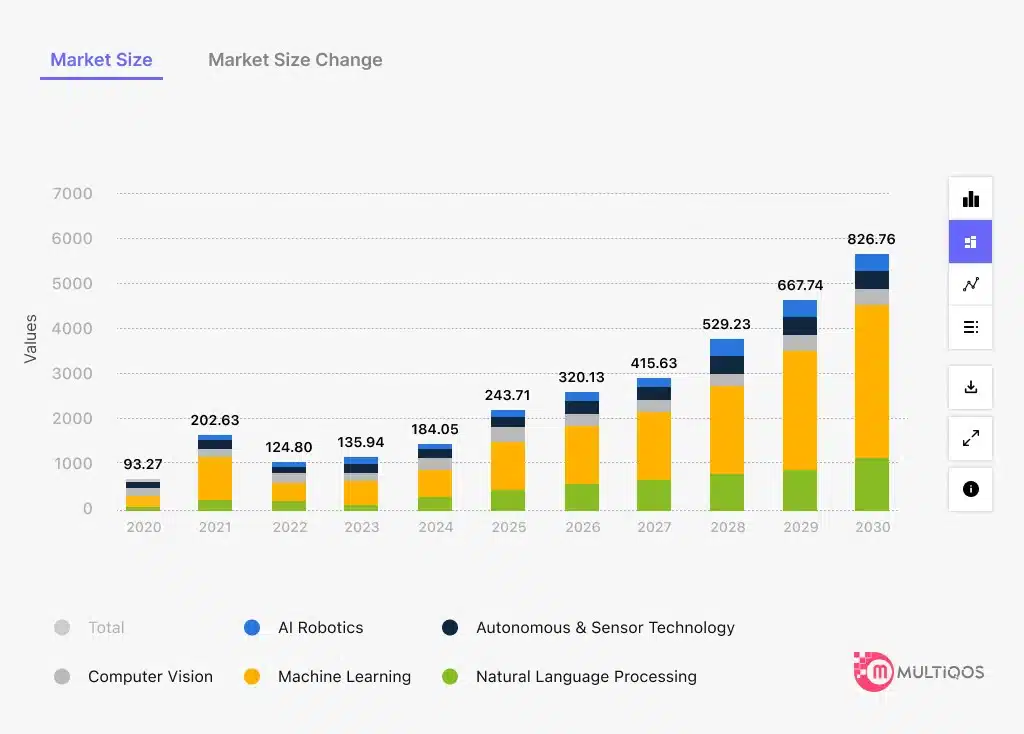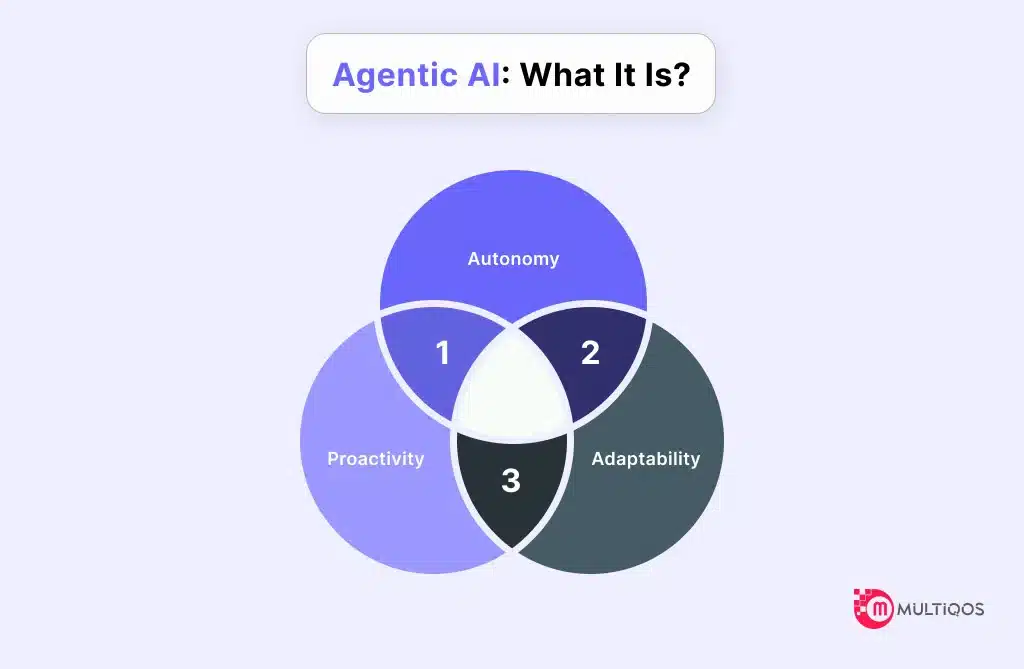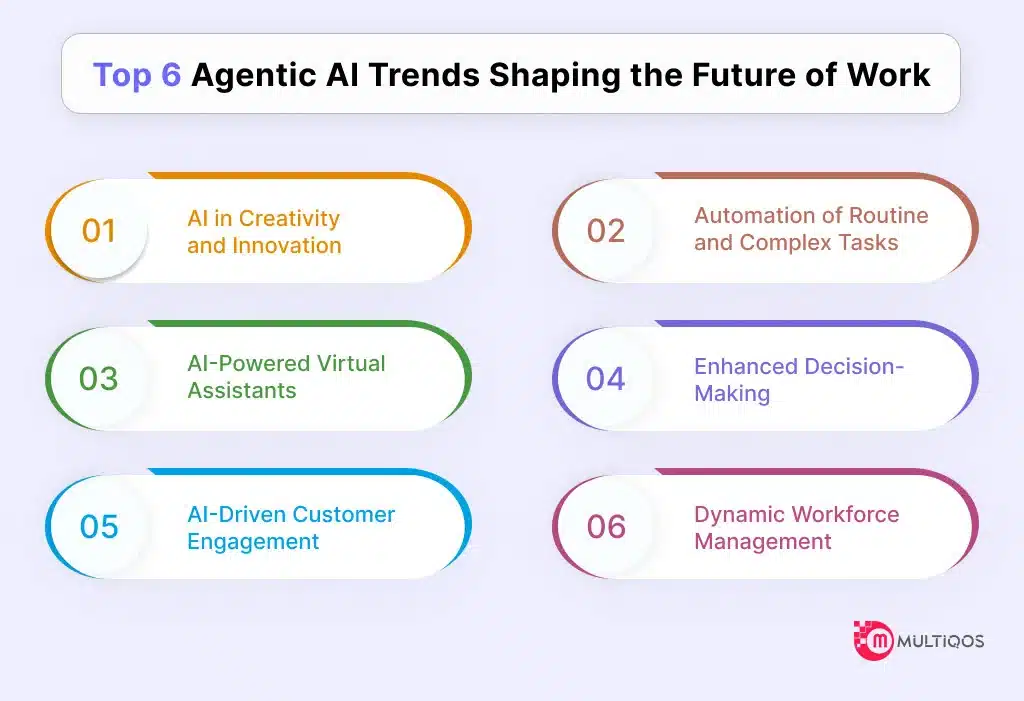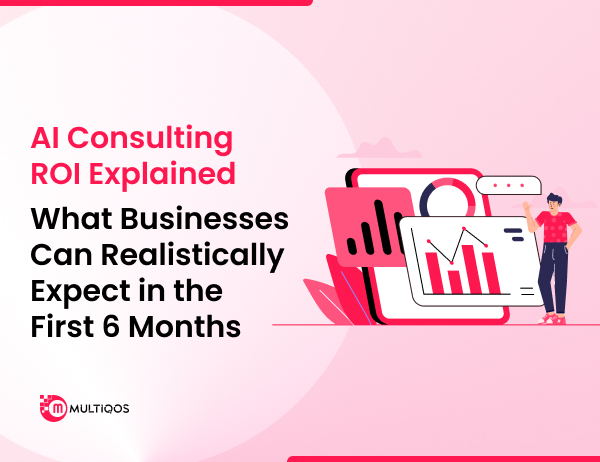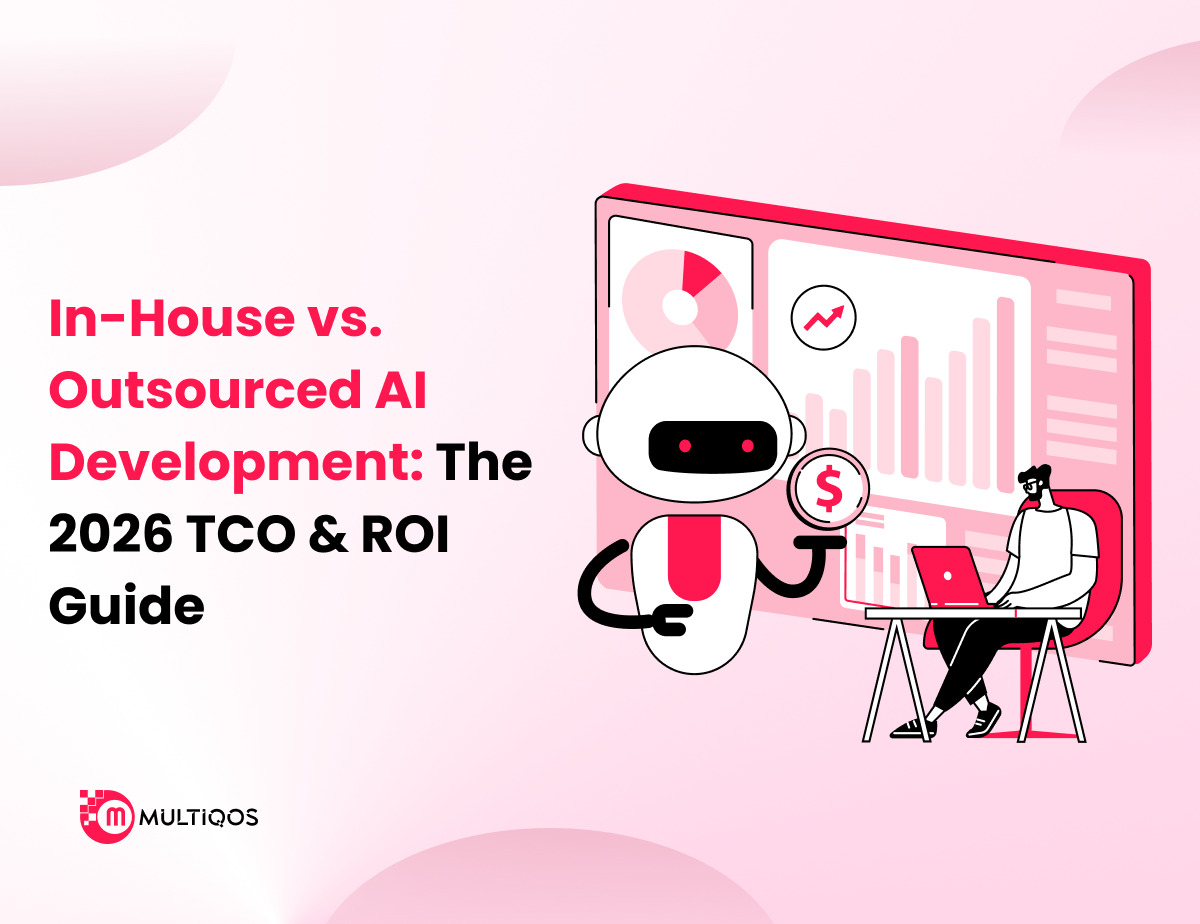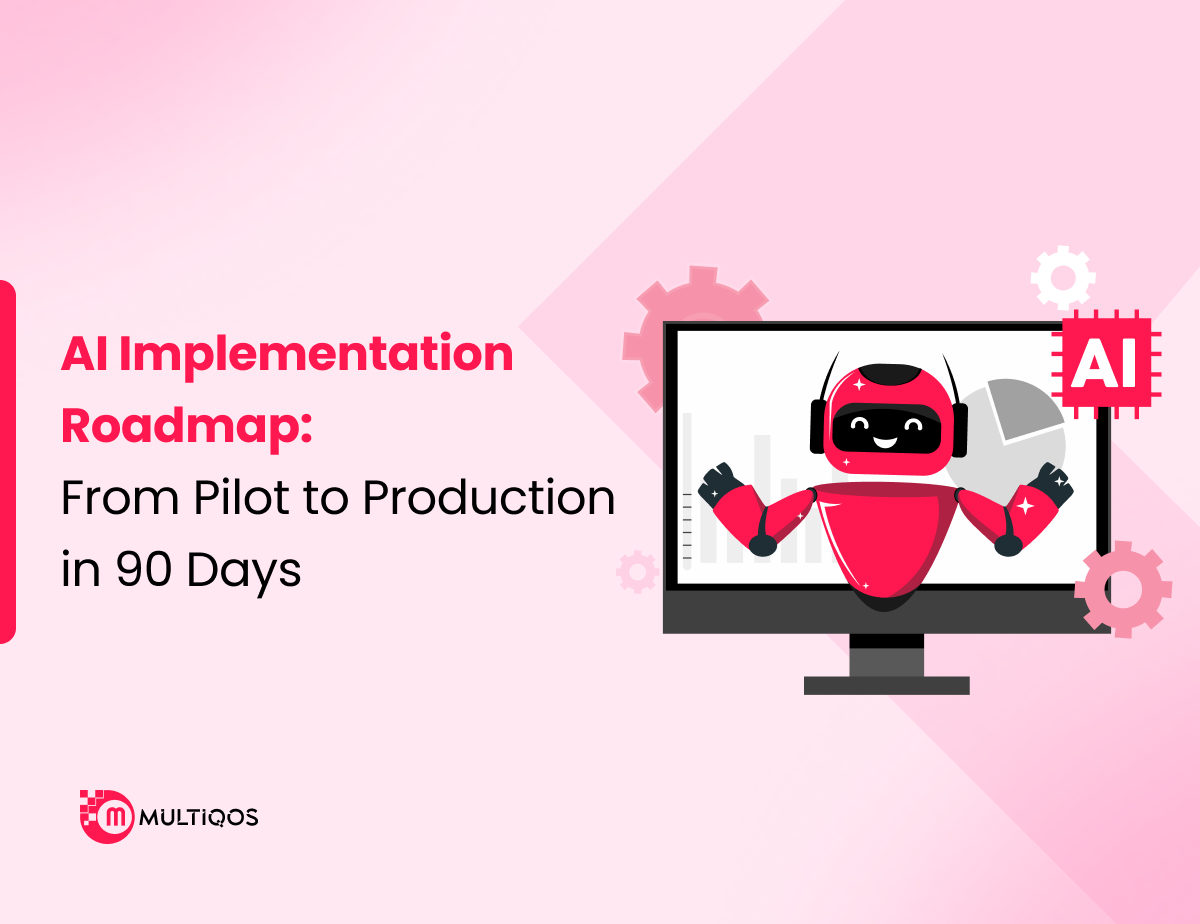Agentic AI and the Future of Work: What You Need to Know in 2025
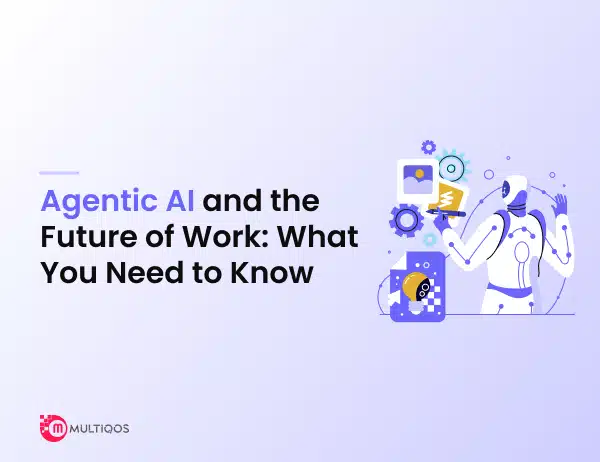
Introduction
Technology evolution is becoming fierce and altering the workplace, and Agentic AI – AI systems capable of autonomous actions within defined parameters – is at the forefront of this transformation.
The AI market is expected to grow at an impressive level to about $310 billion by the end of 2025, most of which will be associated with workplace automation and decision-making. Also, according to Statista, the Artificial Intelligence market worldwide is projected to grow by 28.46% (2024-2030) resulting in a market volume of US$826.70bn in 2030.
From personalized learning platforms to advanced AI-powered decision support, these tools are not simply creating new forms of efficiency, they are creating new forms of work. For businesses leveraging AI development services, the opportunity to integrate agentic AI is becoming a key differentiator in competitive markets.
In this blog, we’ll see how agentic AI is shaping the future, the top trends to watch for, and much more. This is your essential guide to know everything about agentic AI’s impact on the workplace in 2025 and beyond.
Agentic AI: What It Is?
Agentic AI is an advanced artificial intelligence system capable of taking autonomous actions based on predefined objectives and contextual understanding. Compared to conventional AI models that follow explicit instructions, agentic AI operates independently, making decisions and performing tasks without continuous human intervention.
Here are the key characteristics of agentic AI:
- Autonomy: Helps to make decisions based on programmed goals and execute tasks.
- Adaptability: Learning from experiences and data to redefine actions in changing environments.
- Proactivity: Define opportunities and challenges to take preemptive steps to address them.
The essence of agentic AI lies in its ability to augment human efforts and provide automation in some industries, such as dynamic workforce management, cybersecurity, and personalized customer experiences.
Thus, AI continues to progress, agentic AI presents itself as a critical change in reshaping industries and revolutionizing work.
Top 6 Agentic AI Trends Shaping the Future of Work
1). AI in Creativity and Innovation
An ‘intelligent agent’ or a form of AI is becoming an accomplice of creative professionals to make them go further. Even when creating artwork, designing marketing campaigns, or helping with a product design, AI capabilities enhance human creativity by handling all the technical or monotonous brainstorming tasks.
This trend is not about eliminating creative experts but allowing them to experiment and iterate much faster. AI-integrated organizations with creativity generally discover they could reduce time-to-market for new products and services hence, giving them a competitive edge.
2). Automation of Routine and Complex Tasks
Agentic AI is disrupting work environments due to its tendency to automate work at the high and low ends. Routine and mundane processes like data input, stock check, and similar, appointment setting among others are handled by AI to avoid mistakes and free up human resources.
On the other hand, sophisticated AI frameworks are also solving challenging issues like contract interpretation, predicting equipment failures, or performing large-scale financial modeling.
This level of automation makes it most valuable for business sectors such as manufacturing, healthcare, and logistics. That is why with the help of AI, those routine activities can be easily solved and employees can focus on the critical areas that require a creative mindset, critical thinking, or human empathy.
3). AI-Powered Virtual Assistants
Virtual assistants are no longer limited to playing music or setting reminders, but they have evolved to be complex tools that can facilitate a lot of professional activities. Many of these assistants powered by AI can write emails, manage workflow for entire teams, track project deadlines, and schedule meetings.
In customer service, AI bots can handle complex queries, solve problems, and facilitate transitions of clients to human operators.
By 2025, it is assumed that more than 50% of businesses will use AI-driven virtual assistants to increase efficiency and decrease the amount of paperwork. Some of these assistants act as digital coworkers who assist an employee in various organizational tasks and allow them to focus on core responsibilities.
4). Enhanced Decision-Making
Decision-making is paramount to any enterprise, and agentic AI is making it smarter, faster, and more reliable. First of all, AI works with enormous datasets, identifies potential patterns, and provides real-time insights.
In sectors like AI in healthcare translates to detecting diseases more effectively; in finance, it translates to detecting fraud or predicting future trends in the market.
For instance, an AI system might provide a recommendation solution for a supply chain by identifying cost-saving opportunities based on historical performance data. AI in decision-making helps companies have the upper hand in tackling emerging issues and responding to challenges and opportunities faster than ever.
5). AI-Driven Customer Engagement
Consumers have been changing the way they engage with products and services and now agentic AI is here to fill the void. Advanced AI systems can now offer a level of uniqueness that was previously unseen across the segments such as product recommendations, dynamic pricing models, or intelligent bots. These tools do not only respond to customer needs; instead, they predict them.
In customer support, AI chatbots can handle many queries at once, provide immediate answers, and seamless handoffs to human agents when required. Not only does it improve customer satisfaction but also the company’s revenue and brand recognition.
6). Dynamic Workforce Management
Managing a modern workforce – whether a completely remote, in-house, or hybrid setup entails a fair amount of agility and flexibility. The new era of agentic AI is transforming workforce management by scheduling, monitoring productivity, and reallocating resources based on shifting priorities.
For example, historical data may be used to forecast the amount of workforce required during peak times, or adjustments made on timelines to prevent bottlenecks.
This capability is useful for industries that may experience periodic surges of activity in their production or services such as retail and hospitality. Through proper staffing of well-qualified individuals, AI in enterprises can maximize efficiency while reducing employee burnout.
How Agentic AI Differs from Generative AI?
Generative AI works by emerging new materials based on similar patterns learned from data. It doesn’t act within the world but generates outputs in the form of text, pictures, music, or code in response to inputs.
It centers on generating data that resembles what it has been trained on, without eliminating input from the environment. For instance, ChatGPT which generates text, and DALL·E that creates images.
On the other hand, Agentic AI is designed to take action in a dynamic environment to achieve some goals. It helps in decision-making, and plans, and adapts based on feedback from its environment.
This type of AI is driven by goals and autonomous, using real-time data to navigate and overcome problems. Such cases include; self-driving cars, robotic products in manufacturing, or smart home automation.
Conclusion: Embracing Change for Future Success
Looking at the future, the evolution of agentic AI presents both exciting opportunities and significant challenges. Such AI structures are designed to make autonomous decisions and take necessary actions to redefine industries across the board, driving digital transformation.
Agentic AI can conquer a wide variety of objectives starting with operational optimization up to the boosting of creative potential.
The key to navigating the digital world that allows people to stay afloat in such an environment lies in human adaptability by using artificial intelligence systems. Over time, there is going to be a continuous demand for new skills, with a focus on creativity, emotional intelligence, and problem-solving traits that remain unique to humans.
The future of work in 2025 will be defined by a symbiotic relationship between humans and AI, where humans will perform complicated tasks that require critical thinking, while AI handles day-to-day tasks.
By accepting this collaboration, we can get the most out of agentic AI, guaranteeing a future that is both prosperous and ethically sound.
People Also Ask
Indeed, there is no doubt that Agentic AI can help with decision-making due to the speed and accuracy in analyzing large volumes of data, aspects that humans cannot capture. The mundane processes of analyzing data can be handed over to AI, freeing up the human worker to creatively and strategically use AI-generated insights to make decisions.
Regulations play a critical role in ensuring that Agentic AI is used ethically and responsibly. Governments and regulating authorities will start to create legislation related to such questions as data protection, AI responsibility, and avoiding AI biases. It will remain crucial for AI to remain fair and make the process transparent, to adapt to new technologies that continue to emerge.
Manufacturing, customer service, healthcare, and finance are some industries that are expected to be influenced by Agentic AI.
Agentic AI will relieve some of the workload but will not eliminate the need for human workers. Rather, it will augment human activities, especially where decision-making is involved and emotions and creativity are critical factors in solving problems.
To contact us regarding AI services, you can email us at biz@multiqos.com or call +91 8866687330. Our team will then contact you to discuss your AI project requirements further.
Get In Touch

